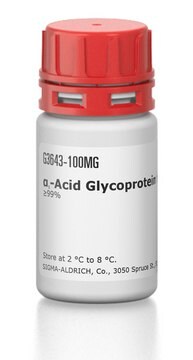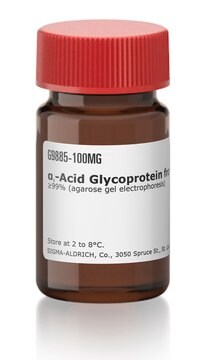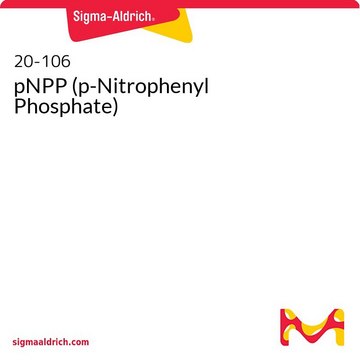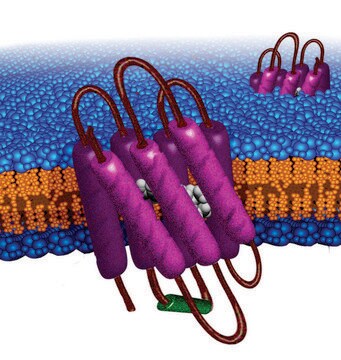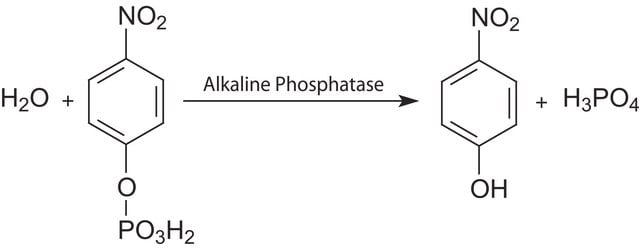推薦產品
生物源
mouse
品質等級
共軛
unconjugated
抗體表格
ascites fluid
抗體產品種類
primary antibodies
無性繁殖
AGP-47, monoclonal
包含
15 mM sodium azide
物種活性
human, baboon (weakly)
應無反應活性
canine, bovine
技術
dot blot: suitable
indirect ELISA: suitable
western blot: 1:10,000
同型
IgG1
UniProt登錄號
運輸包裝
dry ice
儲存溫度
−20°C
目標翻譯後修改
unmodified
基因資訊
human ... ORM1(5004)
一般說明
Monoclonal Anti-α1-Acid Glycoprotein (mouse IgG1 isotype) is derived from the AGP-47 hybridoma produced by the fusion of mouse myeloma cells and splenocytes from BALB/c mice. α1-Acid Glycoprotein (AGP) is an acute-phase plasma protein. This protein is mainly produced in the hepatocytes. AGP1 gene is mapped on the human chromosome at 9q32.
特異性
Recognizes an epitope located on the 44 kDa subunit of denatured-reduced AGP using the immunoblotting technique. It does not cross react with human serum amyloid P component, human haptoglobin, human C-reactive protein, and human IgG.
免疫原
human α1-acid glycoprotein (AGP).
生化/生理作用
α1-Acid Glycoprotein (AGP) associates with haptoglobin and C-reactive protein, which indicates inflammation. Higher levels of AGP is associated with various inflammatory diseases, trauma, malignancies, myocardial infarction, rheumatoid arthritis, after major surgery, and in cases of chronic pain. This protein is capable of binding and transporting basic and neutral drugs.
外觀
The product is provided as ascites fluid with 0.1% sodium azide as a preservative.
儲存和穩定性
For continuous use, store at 2-8 °C for up to one month. For extended storage, the solution may be frozen in working aliquots. Repeated freezing and thawing is not recommended. Storage in "frost-free" freezers is not recommended. If slight turbidity occurs upon prolonged storage, clarify the solution by centrifugation before use.
免責聲明
Unless otherwise stated in our catalog or other company documentation accompanying the product(s), our products are intended for research use only and are not to be used for any other purpose, which includes but is not limited to, unauthorized commercial uses, in vitro diagnostic uses, ex vivo or in vivo therapeutic uses or any type of consumption or application to humans or animals.
未找到適合的產品?
試用我們的產品選擇工具.
儲存類別代碼
10 - Combustible liquids
水污染物質分類(WGK)
WGK 3
閃點(°F)
Not applicable
閃點(°C)
Not applicable
分析證明 (COA)
輸入產品批次/批號來搜索 分析證明 (COA)。在產品’s標籤上找到批次和批號,寫有 ‘Lot’或‘Batch’.。
B Crestani et al.
Journal of immunology (Baltimore, Md. : 1950), 160(9), 4596-4605 (1998-05-09)
Alpha1-acid glycoprotein (AGP) is a major acute phase protein in rat and human. AGP has important immunomodulatory functions that are potentially important for pulmonary inflammatory response. The liver is the main tissue for AGP synthesis in the organism, but the
Tino Hochepied et al.
Cytokine & growth factor reviews, 14(1), 25-34 (2002-12-18)
alpha(1)-Acid glycoprotein (AGP) is a protein with a molecular weight of 41-43 kDa and is heavily glycosylated (45%). Due to the presence of sialic acids, it is negatively charged (pI=2.7-3.2). AGP is an acute phase protein in all mammals investigated
Mosale Seetharam Sumanth et al.
Journal of leukocyte biology, 109(5), 915-930 (2020-10-19)
Alpha-1-acid glycoprotein (AGP-1) is a positive acute phase glycoprotein with uncertain functions. Serum AGP-1 (sAGP-1) is primarily derived from hepatocytes and circulates as 12-20 different glycoforms. We isolated a glycoform secreted from platelet-activating factor (PAF)-stimulated human neutrophils (nAGP-1). Its peptide
Lipocalin 2 in the pathogenesis of fatty liver disease and nonalcoholic steatohepatitis
Asimakopoulou A and Weiskirchen R
Clinical Lipidology, 10(1), 47-67 (2015)
Isabel Jaco et al.
Molecular cell, 66(5), 698-710 (2017-05-17)
TNF is an inflammatory cytokine that upon binding to its receptor, TNFR1, can drive cytokine production, cell survival, or cell death. TNFR1 stimulation causes activation of NF-κB, p38α, and its downstream effector kinase MK2, thereby promoting transcription, mRNA stabilization, and
我們的科學家團隊在所有研究領域都有豐富的經驗,包括生命科學、材料科學、化學合成、色譜、分析等.
聯絡技術服務